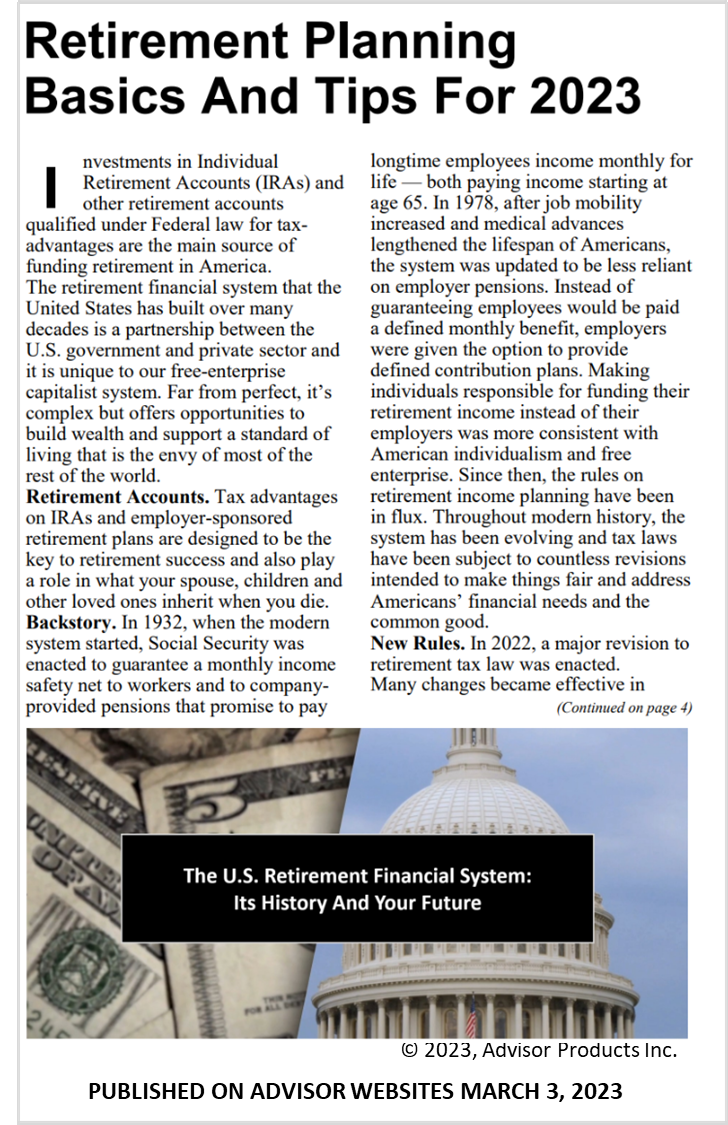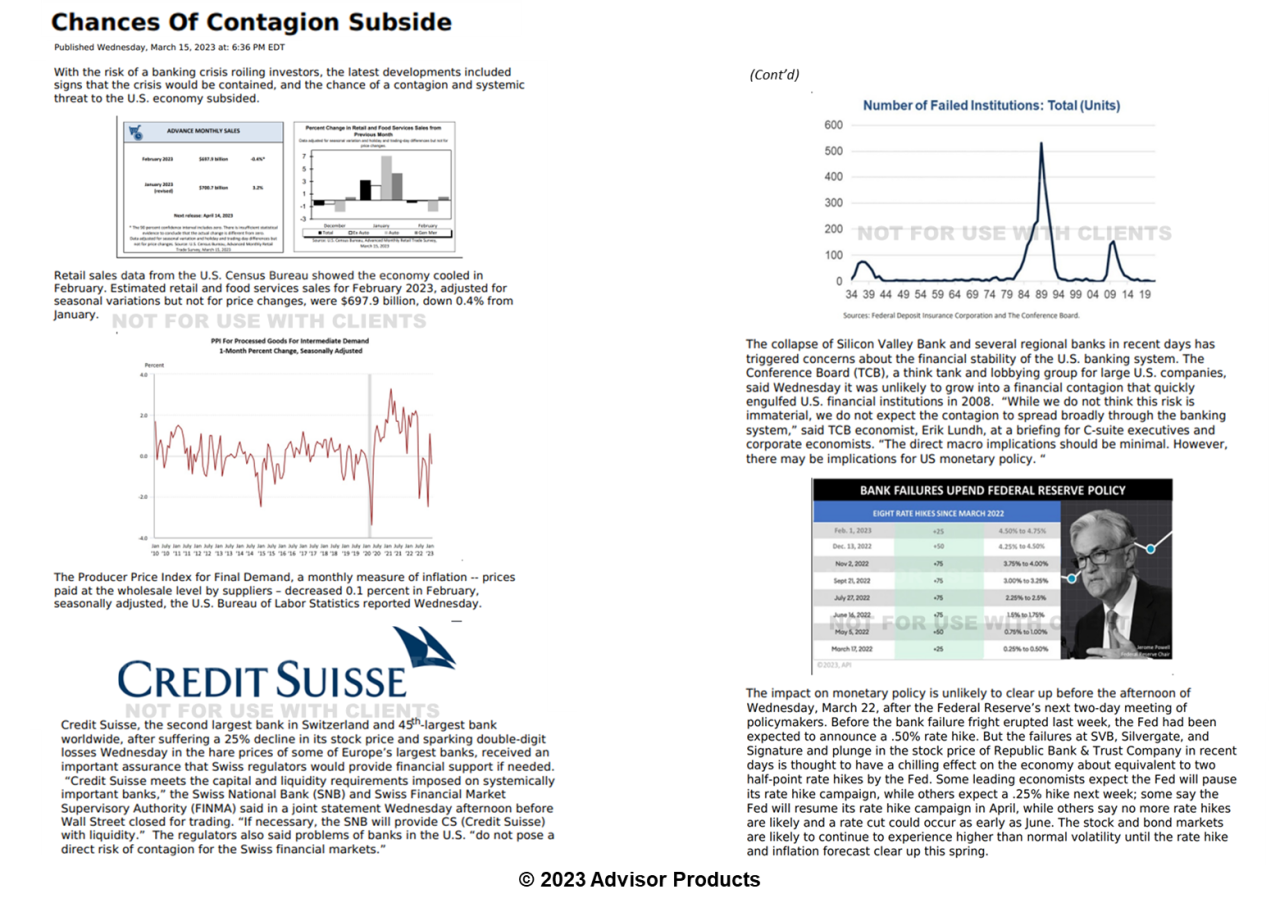- How it works
- Marketing Tools
- Competitive Research
- Finra-reviewed content
- Downloadable Content
- Advisor Education
- Advisor Websites
- Marketing Tips
- Crm Software Integration
- Search Engine Optimization
- Email Marketing Solutions
- Social media Marketing
- Advisor Marketing Videos
- Advisor Print Newsletters
- Advisor Lead Generation
- Expert Market Intelligence
- Branding and Print Materials
- Advisor Blogs
- Advisor Webinars
- Advisor Presentations
- Advisor Client Portals
- Webinars
- Advisor Google And Facebook Ads
- Advisor Public Relations
- About
- Resources
- Login
- Schedule A Demo
Advisor Blog
More On RIA Regulation Changing
Pat Allen's question about my previous post about RIA regulation touches on an important issue. She wrote:
“I've been thinking that the reason Investment Advisors are more communicative on the Web is that they are not regulated by FINRA. Is that right--would you expect that a different advertising standard will be applied? One consequence of which would be that IAs will be discouraged from blogging, tweeting, etc.?”
Yes, that's absolutely right! If you look at the day-to-day compliance issues that SEC- and state-registered RIAs face versus Registered Reps regulated by FINRA, you see that RIAs have a lot more freedom.
The rules reps face are much more stringent because they are supervised by BDs. An advertising-rules manual from a BD that is given to reps is typically 100 pages in length or more.
In contract, RIAs supervise their own compliance and don't create elaborate compliance bureaucracy. They can operate more efficiently and with less hassle--tweeting and blogging, for instance.
Rules RIAs face are very serious but simple. In a nutshelll: disclose all conflicts, don't make anything approaching a false claim, don't advertise a performance track record unless you've had it checked over by an expert in this area, and don't publish any sort of testimonials. That arguably covers just about everything RIAs need to worry about when it comes to advertising.
Keep in mind, the regulation of RIAs is different from regulation of reps for good reason. RIAs have traditionally been a pretty trouble-free area.
When I wrote The Advocate column at Worth magazine during 1994 and 1995, I was charged with helping investors who felt they had been ripped off. I received scores of letters from investors every month. None of them ever was a complaint about an RIA. Not a single one!
Since then, however, many more advisors have realized the benefits of not being affiliated with a BD and have set up RIAs and dropped their securities licenses. Invariably, I fear, the ranks of RIAs have been infiltrated by less competent advisors and some entirely lack integrity. Even an active NAPFA member was recently caught up in scandal.
RIAs should have been more active in policing their ranks themselves. THe FPA, NAPFA, and CFBP Board have made a lame efort at creating a self-regulatory body for over 10 years evenr they it was becoming obvious that the industry was becoming less exclusive and and more open to unethical behavior, and they all failed to get anywhere. Now the horse is out of the corral. We've had Madoff and, worse still, a string of other frauds.
Meanwhile, many RIAS have become irresponsible in following the rules. Just yesterday, for instance, I came across an advisor on LinkedIn who was recommending his partner! That could easily be construed as a testimonial. And what value does it have? It’s an endorsement from his partner! And this is an IA rep I know for years who has been in a leadership position at FPA! He's attended webinars about social networking compliance and knows this is an issue.
Also yesterday, an IA rep told me he had testimonials on his LinkedIn profile page from leaders of important institutions in his niche. When I mentioned that this may violate the rules prohibiting testimonials, he went on a rant about how the rules are outmoded and don’t make sense in a Web 2.0 world. While he may be absolutely right in saying that the testimonial rules on RIAs may be outdated, he can’t just ignore the rules! We'd have anarchy if everyone ignored traffic lights that are unresonably long or stops signs we deem to be misplaced.
Calls for more regulation of RIAs will be hard to fight at this point. The shape and form remains a big unknown. Since RIAs don’t have the equivalent of a BD, what can take its place in a new regulatory regime administered by a branch of FINRA? I wish more advisors would chime in here on this issue.
Questions?
How and why does the Advisor Products system work?
In today’s times, when consumers have become more demanding and tech-savvy, financial advisors must use content marketing to attract, inspire, engage, and convert their prospective customers.
A good content strategy is focused on developing and distributing consistent, valuable content to engage and retain prospective customers and target audience, via your website. Our content library provides financial advisors with fresh, high-quality financial content that is updated regularly, improving SEO along the way. And our automated e-newsletter and social media tools allow advisors to reach out to clients and prospects in an easy-to-use manner, providing frequent touch points for optimal brand building.
- Differentiate you from competitors
- Expose clients and prospects to your brand message more frequently
- Build an ongoing relationship with customers
- Increase your follows and fans on social media
- Drive more prospects to your website
- Help convert prospects into leads
- Increase number of pages indexed in Google
What products and services do you offer?
Can I buy services if my website is not hosted with you?
What can I expect during the onboarding process?
What if I have questions after my website is built?
Seeing is Believing.
See how easy it is to get started with our all-in-one digital marketing platform that drives leads, encourages referrals and increases client engagement.
SCHEDULE A DEMO
By using Advisor Products you agree to our use of cookies to enhance your experience I understand





